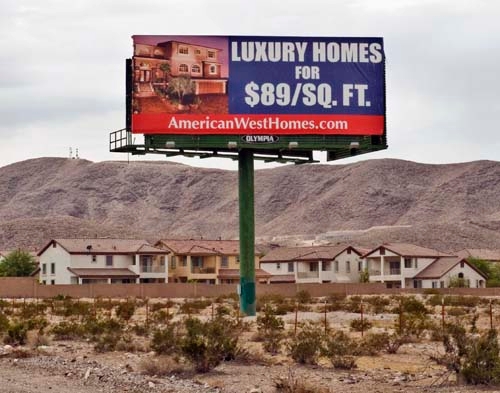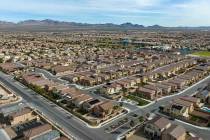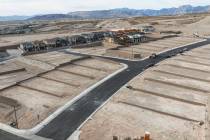Cheap homes may spur companies to move to valley



There’s a silver lining in the fact that your home is worth 60 percent less than you paid for it.
As lawmakers and business leaders debate how to diversify the local economy, the city’s epic real estate crash is quietly doing the job for them. Housing and land values have retreated to 1990s levels, and that’s drawing interest from business executives looking to relocate.
Consider clients of The Boyd Co., a site-selection business based in Princeton, N.J. President John Boyd estimates that he’s seen a 30 percent jump in the last two years in clients asking about relocating to Las Vegas. He attributes to the growing attraction to historically low real estate prices.
"We’re finding that real estate costs are extremely compelling in Las Vegas," Boyd said.
It’s especially compelling to companies looking to move their corporate headquarters, he said.
"And that’s the Holy Grail of economic development," Boyd said. "Corporate headquarters bring in highly paid executives and prestige. They advance the image of your city, and they help with local fundraising. A company that moves in may sponsor charity golf tournaments or be active in the United Way. They’re very good civic building blocks."
Somer Hollingsworth, president and CEO of the Nevada Development Authority, said his economic-development nonprofit has seen queries involving headquarters relocations double in the last year or so. Those potential transplants ask about real estate often enough that the authority now includes housing and commercial prices in its marketing efforts.
"It’s become a whole part of our sales pitch," Hollingsworth said. "It has now become a factor. People are aware of what great deals are here on both sides of the fence (residential and commercial)."
Sure, Las Vegas has other cost advantages in its favor. But it’s the city’s cheap real estate that may make all the difference in rebuilding its economy.
LOW-COST COMPETITION
Las Vegas claims low business costs in general.
It’s true that the city’s energy expenses and shipping costs are slightly higher than average. On taxes, the state offers a mixed bag — no corporate or personal income tax, but no incentives or freebies, either.
Yet Las Vegas has definite pricing advantages overall, Boyd said. Its jobless rate of nearly 14 percent leaves a huge supply of excess labor, which lowers payroll costs.
The city is known nationally for its low property taxes, he added. That’s a big deal because many businesses, particularly in the Northeast and the Midwest, pay big property taxes.
On real estate prices, though, Las Vegas really shines. Land prices off the Strip fell 83 percent from their 2007 peak through June, to $157,000 an acre, research from local consulting firm Applied Analysis shows. Commercial vacancy rates in the second quarter ranged from nearly 25 percent for office space to 18 percent for industrial space and 10.1 percent for retail, the firm said. Rents have fallen 5 percent to 10 percent in the last year alone.
"During the boom period, overly expensive land costs were the Achilles heel of Southern Nevada," Boyd said. "That’s no longer the case, and it becomes one more advantage in terms of more clients buying land, building buildings, amortizing that over 25 years and making it an annual operating cost."
Falling home prices have been equally precipitous.
The median single-family home’s resale value plummeted from $290,000 in October 2006 to $120,000 in August, numbers from the Greater Las Vegas Association of Realtors show.
Housing prices are a secondary advantage in drawing relocations, particularly of corporate headquarters, Boyd said. That’s because the home office brings dozens, or even hundreds, of key executives and employees, all of whom need housing.
"The residential real estate market that’s so attractive is part of the building block of attracting corporations to Southern Nevada," he said.
Hollingsworth’s group is in talks with a Western technology company to move its corporate headquarters, complete with more than 100 people earning $30 to $40 an hour, to Las Vegas. Executives visited Las Vegas in mid-September for a grand tour. The authority showed them several planned communities and brought in housing experts to talk about average prices on foreclosures.
"When we told them they could buy a brand-new home in Las Vegas for less than $100 a square foot, their jaws dropped," Hollingsworth said. "They said, ‘You’ve got to be kidding.’"
Adam Bruns, managing editor of Site Selection magazine, agreed that housing costs matter in some corporate relocations. He cited a Florida-based health-care business that abandoned a pricey corner of the Sunshine State for relatively cheaper Louisville, Ky.
"The leadership told us in part that they needed to keep their good people, and having them be able to live comfortably for a lot less money was a factor," Bruns said. "It seemed like a relevant factor for that company, though it might not be for others."
What’s more, it’s a great time to be headhunting for headquarters.
Traditionally, companies might change a warehouse location or send customer-service functions offshore, but moving the home office was off the table. That all changed in 2001, when Boeing transplanted its base from Seattle to Chicago, Boyd said.
In today’s cutthroat economic environment, costs matter more than revenue. With companies focused so intently on expenses, Southern Nevada should be in the catbird seat. Companies that decide against moving here often do so because the state lacks incentives, not because its costs are too high or its schools and museums aren’t up to snuff, Boyd said.
HOW LOW CAN IT GO?
For a look at just how inexpensive housing has become in Southern Nevada, talk to apartment landlord Scott Sesso.
Sesso offers some of the most affordable housing available in Las Vegas, next to living under a freeway overpass.
He’s got one-bedroom units renting for $400 a month — $450 if you want a ceiling fan — new flooring and fresh paint. Two-bedroom units are $500 a month at his Island Court Apartments, near the corner of F Street and Owens Avenue in West Las Vegas.
That’s considerably less than the $758 monthly average reported by Las Vegas-based business advisory firm Applied Analysis. And Sesso said his occupancy rate is nowhere near the region’s 92 percent average. More than half of the 20 units at Island Court are vacant, one since last October.
That’s why he’s offering a move-in special: $199 for the first month, with no credit check.
"My rents are cheaper than any place around me," Sesso said as he showed an empty unit in the gated complex. "If people are looking for something economical, come west.”
That hasn’t always been the case. With 40 percent and 50 percent quarterly appreciation in 2004 alone, median home prices surged to more than $300,000.
Then the bubble burst. Home values fell to 20-year lows, and Las Vegas became one of the nation’s most affordable housing markets. A recent report from Discovery Bay, Calif.-based real estate search company Trulia.com ranked Las Vegas No. 1 for buying versus renting, based on the cost for a two-bedroom apartment or town home.
California-based John Burns Real Estate Consulting also ranks Las Vegas at 0.0 — the lowest possible reading — on its August housing affordability index.
With a median home price of $120,000, the housing cost-to-income ratio for Las Vegas is 17 percent, compared with 25.5 percent nationwide.
The median home price-to-income ratio is 3.3, which is slightly above the long-term historical norm and near a level conducive to market health, Burns said in his monthly report.
The bottom line?
Housing analyst Dennis Smith, of Home Builders Research, said Las Vegas prices are affordable enough to attract buyers from anywhere in the world.
Contact reporter Jennifer Robison at jrobison@reviewjournal.com or 702-380-4512. Contact reporter Hubble Smith at hsmith@reviewjournal.com or 702-383-0491.


















